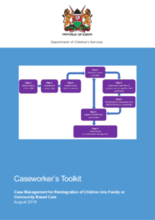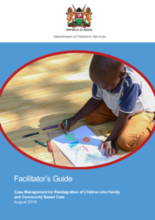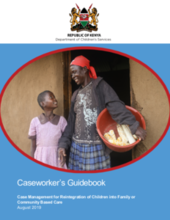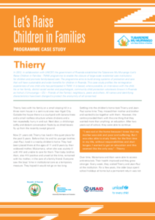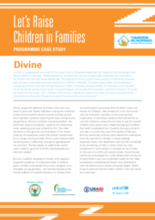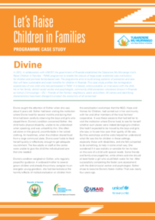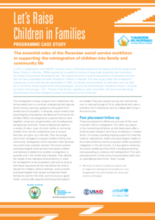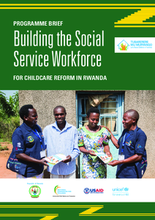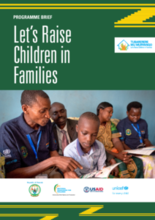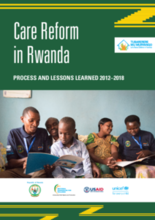Displaying 91 - 100 of 416
This toolkit contains caseworker forms for: conducting child and family assessments, consent and assent from caregivers and children, case planning, placement of children and young adults, monitoring, case reviews, case closures, referrals, caregiver and child feedback, and more.
This Facilitator’s Guide is for use by the varied facilitators of the 'Promoting Family- or Community-Based Care Using a Case Management Approach Workshop,' including national and county trainer of trainers from Kenya's Department of Children's Services, and trained staff from other care reform partners.
This guide provides an overview of the principles and practices of case management for reunification and placement of children outside of parental care (e.g., children from Charitable Children’s Institutions (CCIs) and Statutory Children’s Institutions (SCIs) , and street-connected children) into family- and community-based care in Kenya.
This case study profiles the reintegration experiences of one child who has participated in the Tubarerere Mu Muryango (Let’s Raise Children in Families - TMM) programme in Rwanda.
This case study profiles the reintegration experiences of one child who has participated in the Tubarerere Mu Muryango (Let’s Raise Children in Families - TMM) programme in Rwanda.
This case study profiles the reintegration experiences of one child who has participated in the Tubarerere Mu Muryango (Let’s Raise Children in Families - TMM) programme in Rwanda.
This case study profiles the reintegration experiences of one child who has participated in the Tubarerere Mu Muryango (Let’s Raise Children in Families - TMM) programme in Rwanda.
This programme brief is part of a package of materials documenting successes and lessons learnt from implementation of the Tubarerere Mu Muryango (TMM) child care reform programme between 2012 and 2018.
This paper documents the care reform process and presents key lessons learnt. It is based on a review of Rwandan policy and programme documents and on interviews and focus group discussions with 65 stakeholders.

